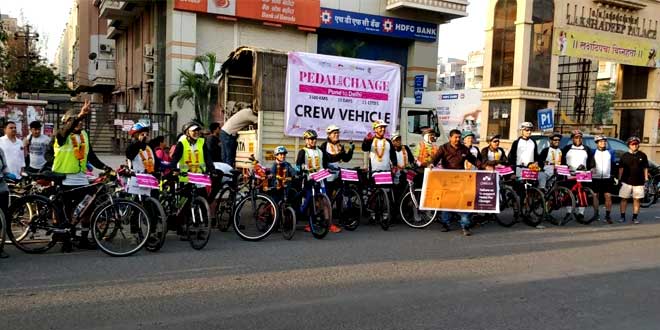New Delhi: While most people would agree that cycling is one of the best ways to commute, there are many for whom paddling for even five kilometre would be a daunting task and they end up using a polluting vehicle like a car or a scooter for the same. However, 19 cyclists from Pune have decided to change this by conducting a rally from Pune to Delhi to build awareness on air pollution caused by vehicular emissions. By traveling over 1500 km, these cyclists have proved that these zero-emissions can be easily adopted as a way of life which will also help in combating vehicular pollution.
The rally, which was organised in collaboration with NGOs (Non-governmental organisations) BSR Sparsh Foundation and Rotary club, Pune, stopped in 15 cities where they conducted discussions and workshops on air pollution.
The rally was flagged off from Pune on March 7 and covered cities including Khopoli, Vasai, Vapi, Surat, Baroda, Ahmedabad, Udaipur, Jaipur, Neemrana, Gurgaon. It reached Delhi on Friday (March 22).
Also Read: Air Pollution Kills Around 6 Lakh Children Every Year, Says United Nations
Leading the rally, Sanjay Katti, Deputy Manager at Mercedes Benz and an avid rider under the 60+ age category said,
There is a direct relationship between the burning of fossil fuel for powering vehicles and increase in particulate pollutants in the air. We conducted this cycling event for the public to conceptualise the air pollution crisis and adopt cleaner mobility alternatives. The unique feature about the rally is that it saw participation from people of all age groups. It was encouraging to see people becoming more concerned about the environment. Agreed that cycle is not as fast or comfortable as a car but it will keep you and the environment healthy.
He further said that it is the high time that we defer our own interests and focus on improving the environment for the coming generations. According to Mr. Katti, while riding through 15 cities, apart from air pollution, congestion was also a common sight which is also a major cause of vehicular pollution on city roads. He said,
Most cars on road in almost all cities were carrying only one person. People need to change their attitudes toward owning cars and must start using public transport.
The rally highlighted the findings of a recent study conducted by the International Council on Clean Transportation (ICCT) according to which more than 3.85 people were killed worldwide due to vehicular emissions. Most of the deaths, as per ICCT happened in China and India, the most polluted countries in the world.
According to Sunil Dahiya, Clean Air Campaigner, Greenpeace who participated in the rally in Delhi, the group has been able to prove that if they can ride cycle for travelling from Pune to Delhi then anyone can use cycle as a mode of mobility for their intra-city travels. Mr. Dahiya said,
Non-motorised transport (NMT) options such as cycling and walking are the best way to commute within cities resulting not just in health improvements but in the reduction of air pollution and climate change as well by reducing our fossil fuel consumption. Improved infrastructure and usage of NMT makes our cities more livable by improving quality of life. Every institution and office should encourage its employees to use walking, cycling, public transportation, and electric vehicles for the daily commute by providing incentives for such option and fines/fees for usage of private diesel vehicles.
Talking about the outcome of the initiative, Mr. Katti said that most participants especially children and elderlies vowed to increase the use of cycles in daily routine and ditch polluting vehicles for commuting short distances. Mr. Katii further said that the same group of cyclists will come together again soon to conduct a rally from Pune to Kolkata to promote cycling and to make people aware about the matter of urgent attention- air pollution.
How Air Pollution Is Affecting The Planet
Experts say that vehicular emissions contribute to nearly 50 per cent particulate pollution in India. In the major metropolitan cities, according to Centre for Science and Environment, vehicular exhaust accounts for 70 per cent of all carbon emissions. This poses serious threat to the health of the people exposed to the polluted air as evident from ICCT’s study which says that, as many as 74,000 people died due to vehicular pollution in India in 2015.
Also Read: Environment Damage Behind 1 In 4 Global Deaths, Disease, Says United Nations
NDTV – Dettol Banega Swachh India campaign lends support to the Government of India’s Swachh Bharat Mission (SBM). Helmed by Campaign Ambassador Amitabh Bachchan, the campaign aims to spread awareness about hygiene and sanitation, the importance of building toilets and making India open defecation free (ODF) by October 2019, a target set by Prime Minister Narendra Modi, when he launched Swachh Bharat Abhiyan in 2014. Over the years, the campaign has widened its scope to cover issues like air pollution, waste management, plastic ban, manual scavenging and menstrual hygiene. The campaign has also focused extensively on marine pollution, clean Ganga Project and rejuvenation of Yamuna, two of India’s major river bodies





























